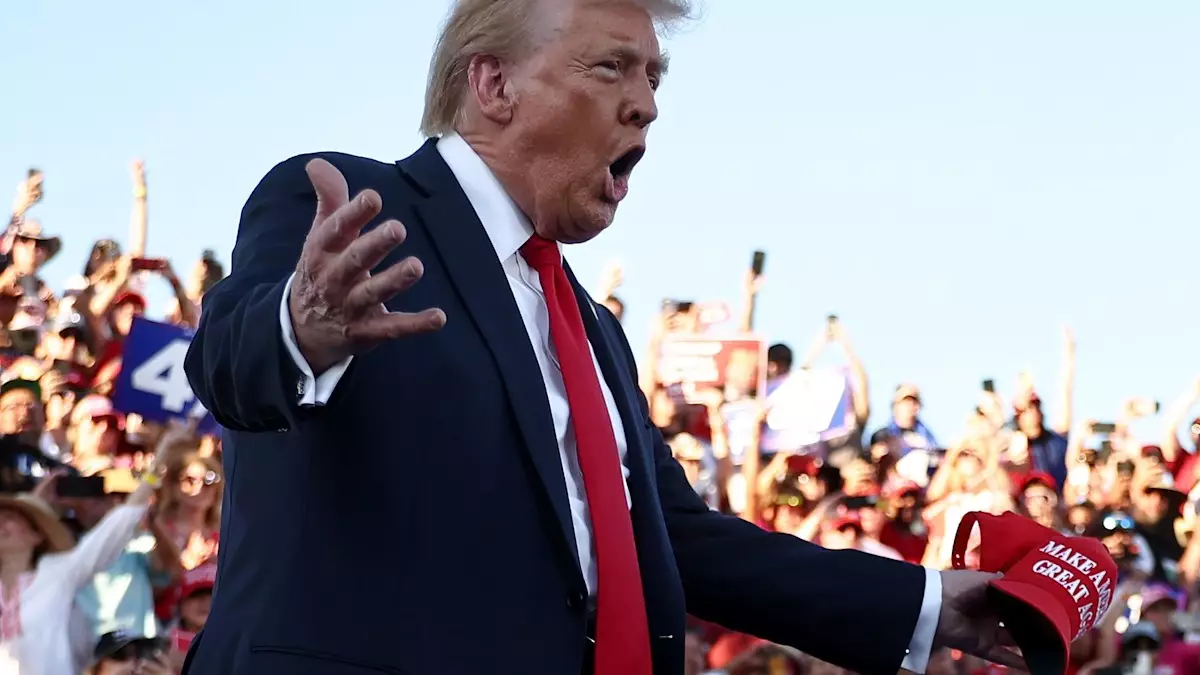In a staggering incident over the weekend, authorities arrested a man armed with firearms near a rally for former President Donald Trump in California, raising serious alarms about national security and political tensions in the United States. Vem Miller, age 49 and a resident of Las Vegas, was apprehended approximately one mile from the Coachella Valley rally, where Trump had been rallying supporters amid a backdrop of soaring temperatures and political fervor. Riverside County Sheriff Chad Bianco has described the situation as potentially thwarting an assassination attempt targeting Trump himself, underscoring the incident’s severity.
Miller was stopped at a checkpoint by deputies who quickly discerned irregularities in the identification he presented. This led to a search of his vehicle, where officers discovered a loaded handgun, a shotgun, and a high-capacity magazine. In addition to these alarming weapons, Miller possessed dubious press credentials and VIP access passes, further deepening suspicions about his intent at the rally. Sheriffs have expressed grave concern regarding Miller’s affiliations, suggesting he might be connected to a right-wing anti-government organization—a detail that adds another layer of complexity to the unfolding narrative.
Impact on National Security and Political Climate
The implications of this arrest extend far beyond the immediate event. It raises fundamental questions about the safety of political figures and the potential for violence in today’s highly polarized environment. The fact that Miller, a well-educated individual with a master’s degree from UCLA and previous experience as a political candidate, sought to approach a high-profile rally armed, demonstrates a worrying escalation in the threats facing politicians. This incident exemplifies the growing normalization of violence in political discourse, a trend that has been increasingly evident in recent years.
Sheriff Bianco’s statement regarding the likelihood of an assassination attempt suggests that law enforcement is acutely aware of the rising threats. The use of faux credentials indicates a calculated effort to infiltrate political events, further complicating security efforts. The nature of political rallies, which are typically intended to foster engagement and enthusiasm among supporters, is being overshadowed by fears of violence and disruption. In this context, heightened scrutiny of participants at future events seems not just prudent but necessary to ensure the safety of all involved.
The Broader Political Landscape
The timing of this arrest and the charged atmosphere surrounding Trump’s rally could not be more significant. The rally drew a large crowd in the heavily Democratic state of California, a strategic yet controversial choice for the former president amid his ongoing campaign efforts. Political analysts have noted that Trump’s determination to rally in such unfriendly territory might indeed signal an attempt to energize his base and expand his national profile. However, it also exposes him to increased risks, particularly given the current climate of extreme partisanship.
Miller’s subsequent release on bail and scheduled court appearance on January 2, 2024, suggest that while the immediate threat may have been mitigated, the underlying issues persist. The lack of commentary from Trump’s campaign or the U.S. Secret Service on the matter only adds to the unsettling nature of the event. It raises speculation about the adequacy of security at these gatherings and the overall strategies employed to safeguard former and current public officials alike.
As the nation navigates an increasingly complex political landscape, incidents like the Vem Miller arrest should serve as critical wake-up calls. The danger of politically motivated violence looms larger than ever, necessitating reassessment of security measures at political events. Given the volatile mix of ideologies, heightened tensions, and armed individuals, ensuring safety for public figures and their supporters will require a multi-faceted approach that combines vigilance and preparedness.
Furthermore, the conversation surrounding the root causes of such threats should be broadened to include discussions on political rhetoric, mental health, and the influence of extremist organizations. Only by addressing these issues can society hope to foster an environment where political dialogue remains constructive and violence becomes a relic of the past. As we move forward, it is imperative to learn from incidents like these and take proactive measures to safeguard the democratic process and the individuals who participate in it.

Leave a Reply